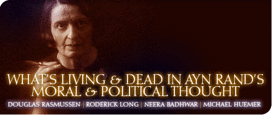Mike wants to know whether all I’m saying re Rand’s biological defense of egoism is that it’s “incoherent to doubt that one should pursue one’s interests.”
Well, not quite all. It sounds as though Mike is inviting me to dispense with my “good for” talk in favor of talk about interests. But I think the “good for” talk is essential, because the reference to “good” is essential. Seeing something as in one’s interest doesn’t by itself carry with it any conceptual necessity to value the thing unless we have that link between interest and goodness; the conceptual necessity of valuing one’s interests is parasitic on the conceptual necessity of valuing goodness.
Here’s what I mean. “Good” is action-guiding; to see something as good is to be committed (ceteris paribus) to favoring it, pursuing it, endorsing it, etc. “Good for X” is not ordinarily action-guiding; I can see something as good for X and quite rationally not give a damn; what’s good for the virus is no concern of mine. But when I recognize myself as X, then (I claim) the qualifier drops away and I have to regard what’s good for X as good simpliciter.
By “good simpliciter” I don’t mean good from some agent-neutral point of view. Rather, I just mean this: I can see something as valuable from X’s perspective and yet not value it; but not when I’m X. I can’t see something as valuable from my perspective and yet not value it, because I can’t get out of my perspective.
I mean the term “perspective” in a broad way that applies to plants too; I’m not talking solely about conscious agents. However, if one is a conscious agent, then one’s perspective in the narrow sense needs, on pain of incoherence, to be responsive to one’s perspective in the broad sense.
I regard the situation as analogous to Moore’s Paradox. There’s no incoherence in saying “It’s raining, but X doesn’t believe it is” — unless I am X. “It’s raining, but I don’t believe it is” is indeed incoherent.
As for why the biological references aren’t dispensable, I think we need those to give content to the notion of “interest.” An interest isn’t just anything I happen to want; to want something is inter alia to judge that it’s worth having, and those judgments can be true or false; so we need something independent of our wants to be what makes them true or false, and life is the phenomenon that gives value-concepts their purchase.
Where the eudaimonic and instrumentalist strands differ is in the role assigned to those biological considerations; the instrumentalist strand makes mere survival the goal and a definite mode of survival the means, while the eudaimonic strand makes a definite mode of survival the goal.
In answer to Mike’s question about why non-flourishing people don’t also count as enjoying a definite mode of survival, let me point to a certain mode of argument that the eudaimonist can accept while the instrumentalist can’t: if my goal is to survive in a human manner, then if life A is more human than life B, then life A has better claim than life B to be my goal.
The instrumentalist can’t consistently accept that claim; if your goal is just to live, say, a human life, or a reasoning life, then hey, Hitler was human and alive, and he could reason enough to find his way to the bathroom, so he must have been achieving the goal – and then any fancier considerations will have to enter at the level of implausible claims about, e.g., strategies needed to ensure longevity.
But the eudaimonist can say that if some lives are more human than others, or more fully exemplify what is most essentially human, then those lives are more fully candidates for the good human life — so that our goal will be not to live a minimally human life but to live one that excels at being human.
And what’s attractive in Rand, I maintain, is the respects in which she sets out that latter vision, even when aspects of her theorizing pull her at the same time toward the instrumentalist approach.

